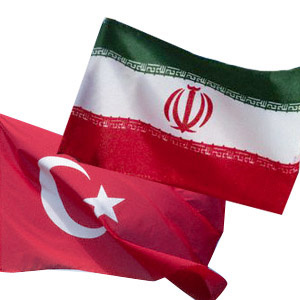The Bridge to West

Mahmoud Ahmadinejad will visit Turkey in three days to attend the economic summit of Islamic Organization Conference (OIC). Turkish Prime Minister Recep Tayyip Erdogan had visited Iran last week to discuss issues of mutual interests with Iranian officials. Asadollah At-hari, Turkish affairs analyst discussed the significance of Iran-Turkey relations:
It is clear that the incumbent Turkish prime minister is willing to integrate Iran within the modern, international community. There was a time that the basic plan on the table was Iran’s punishment and isolation. However, West is now willing to incorporate Iran within the global order, since that is an easier way to cooperate with and contain Iran.
In this project, Turkey, Five plus One and even the global public opinion have a specific role. According to a Gallup survey carried out in February 13th of 2009, 56% of Americans said the United States should engage in direct diplomacy with Iran. This tendency is in fact a reaction to the unilateral approach adopted by neo-cons during George W. Bush’s presidency. With Obama, the unilateralism has been replaced by a multilateral approach which gives every actor a role. Negotiations between Iranian and American representatives and unconditional talks clearly prove that.
Democrats’ overall strategy is to reconstruct US shattered global image up to 2012. In 2007, in an article Barack Obama claimed that threat is no longer a solution, though military operations are always an option. He also believed that the United States should immediately engage in talks with Iran and that America should show the Iranian nation benefits which lie in engagement, including economic exchanges, security guarantees and diplomatic ties. Obama’s letter to the Iranian supreme leader and talks between Iranian and American representatives on the sidelines of the Geneva negotiations were part of the new US strategy.
Along with this, Iran and Turkey are expanding ties. This can be analyzed with regard to both global interactions and bilateral ties. Iran has always regarded Turkey as a passageway to the world outside at the height of international pressure, sanctions and resolutions. Turkey played the same role for Iran during its 8-year war with Iraq.
Iran and Turkey enjoy closer political and economic ties. They have made agreements in the energy section and security cooperation is close. Political, economic and security partnership are the priorities of these neighboring countries. Military cooperation can also be an option to ponder on.
However, it should not be forgotten that Turkey is way ahead of Iran. With the struggle between Iran and West, Turkey has turned into an energy hub for Europe, it has brokered negotiations between Syria and Israel, and has initiated a project of reconciliation with Armenia. Turkey is active in Afghanistan and Iraq, has turned into the seventeenth powerful economy of the world and has managed to solve its domestic economic problems. It is a member of the NATO and G20.
Turkey can be used as a bridge to West. But how well this opportunity is used depends on Iran’s intention. In other words, Iran should decide whether it wants to integrate within the international community and abide by its norms, or it wants to change the global order. This is a crucial decision.

